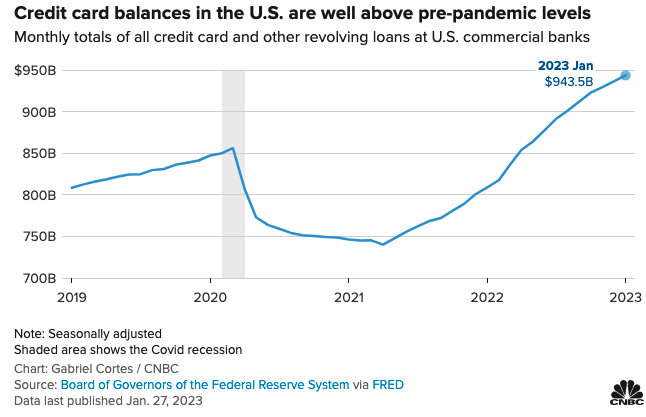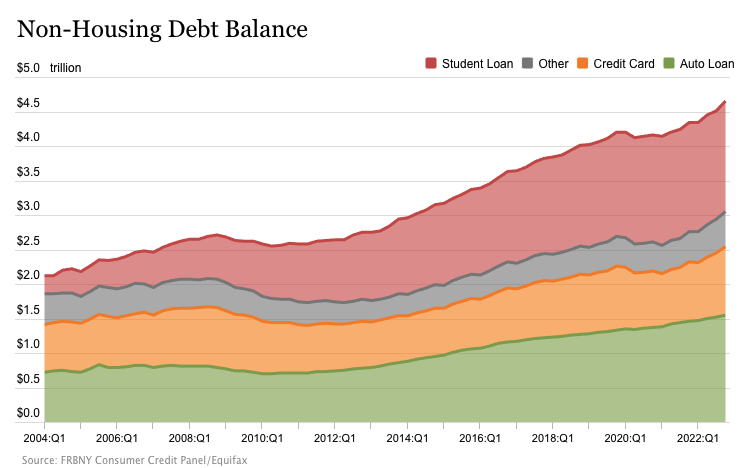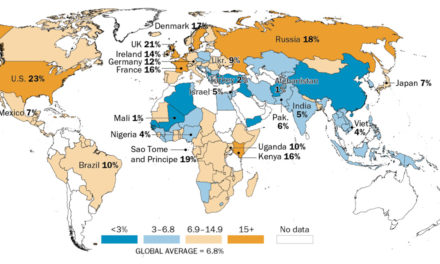Credit card debt has hit a dramatic new all-time high, as many American families are getting close to a financial “breaking point.”
Total credit card debt hit a record $930.6 billion at the end of 2022, according to CNBC, with the average balance per credit card hitting $5,805.
According to Jill Gonzalez, an analyst at WalletHub, credit card debt is close to reaching a level that will become “unsustainable” for most individuals.
“It’s when people won’t be able to keep up with their bills,” she said. “We’re inching closer and closer to that breaking point.”

Photo Credit: CNBC
However, it’s not only credit card debt that is keeping many Americans living paycheck-to-paycheck. There are various other forms of debt, including student loan debt, automotive loan debt and “other” forms, like retail cards and other consumer loans.
At the end of the fourth quarter of 2022, Americans also had the following amounts in debt:
- $1.6 trillion in student loan debt.
- $1.55 trillion in automotive loans.
- $510 billion in “other” debt.
All told, Americans currently owe more than $4.65 trillion in non-housing debt.

Photo Credit: New York Fed
However, if you add in housing debt – mortgage balances – which add up to $11.92 trillion, Americans’ total household debt currently stands at $16.90 trillion.
This massive level of debt is having a stark impact on many families – many of which are barely scraping by.
According to one 2022 survey, most Americans would not be able to cover a $1,000 emergency. In fact, 56% of Americans say they would not be able to pay for an unexpected $1,000 bill with savings.
20% of Americans would put the $1,000 emergency bill on a credit card, 15% would pay it by cutting out other expenses, 10% would opt to borrow from a friend or family member and 4% say they would have to take out a personal loan.
In the same vein, Americans are currently saving a remarkably low amount of their after-tax earnings. The Federal Reserve Bank of St. Louis reports that Americans on average save just 4.7% of their net earnings, as of January 2023.
Financial troubles can take an enormous toll on marriages and families, who are struggling to afford the basic costs of living. As the Daily Citizen has previously reported, a newly released financial index found a “catastrophic erosion” of middle-class life in America in recent decades.
This index found that “a typical worker cannot afford to support a family anywhere in the United States.”
When these workers, who are fathers, mothers, sons and daughters, struggle to make ends meet, family life often suffers as a result.
One 2018 survey found a convincing link between relationship difficulties and finances. This survey found that “money fights are the second leading cause of divorce, behind infidelity” (emphasis added).
“Both high levels of debt and a lack of communication are major causes for the stress and anxiety surrounding household finances,” the survey found. Here are a few other findings from the survey:
- Nearly two-thirds of all marriages start off in debt.
- One-third of people who say they argued with their spouse about money say they hid a purchase from their spouse.
- Ninety-four percent of respondents who say they have a “great” marriage discuss their money dreams with their spouse.
- Sixty-three percent of those with $50,000 or more in debt feel anxious about talking about their personal finances.
Craig Constantinos, MA, LPCC, is a counselor in the Counseling Services Department at Focus on the Family. He spoke to the Daily Citizen about how tough economic times and financial stressors can lead to difficulties within marriages.
“Stress and anxiety about the economy can often lead to frustration and conflict in marriages, as finances is one of the areas where different perspectives are most obvious,” Constantinos told us.
“Having a grace-filled conversation about budgets and spiritual and financial goals can lead to deeper understanding in a marriage, which can turn the challenge of financial uncertainty into an opportunity to build one’s relationship with God and their spouse.”
If you’re struggling and need to speak with someone, Focus on the Family offers a free, one-time counseling consultation with a licensed or pastoral counselor. To request a counseling consultation, you can call 1-855-771-HELP (4357) or fill out our Counseling Consultation Request Form.
In addition, you can purchase a copy of Dave Ramsey’s bestseller The Total Money Makeover: A Proven Plan for Financial Fitness from the Focus on the Family bookstore here.
Related articles and resources:
Counseling Consultation & Referrals
New Family Affordability Survey Finds ‘Catastrophic Erosion’ of Middle-Class Life in America
Getting a Reluctant Spouse Onboard with Budgeting
Money Talk: The ‘You’ in ‘Unity’ is Silent
Photo from Shutterstock.






